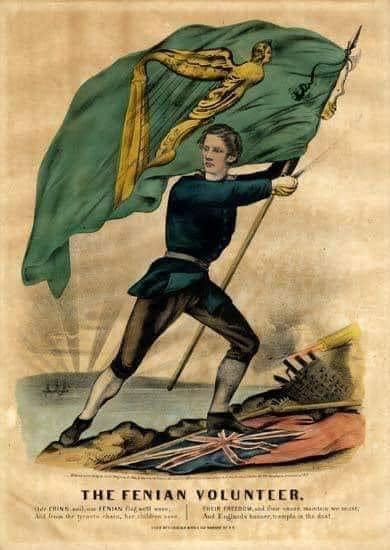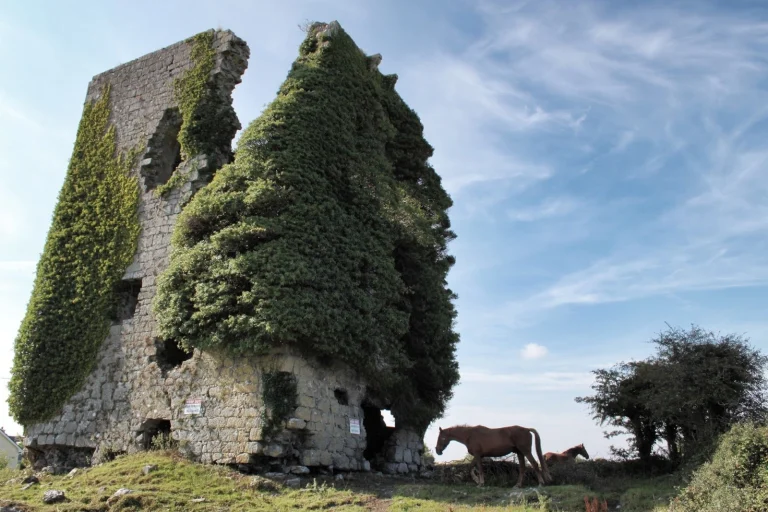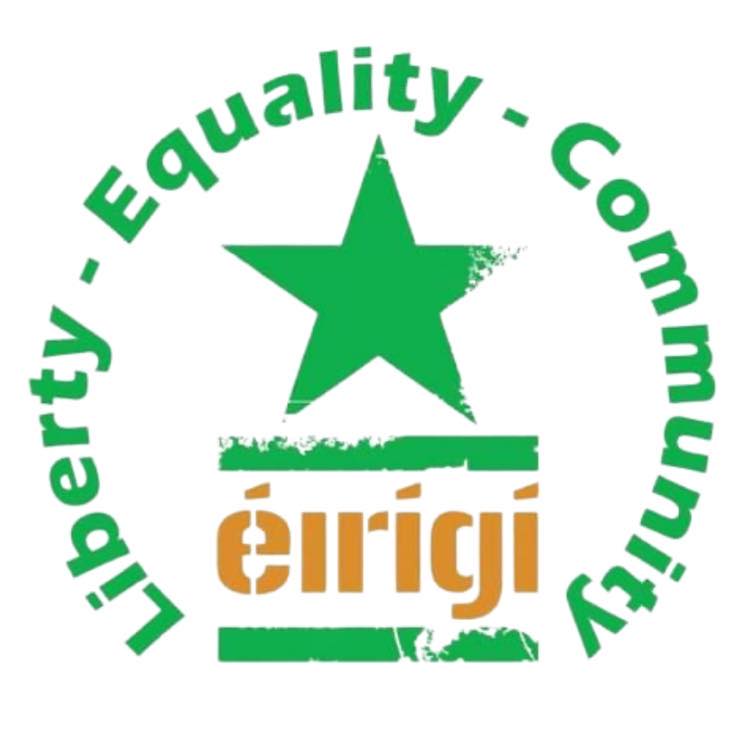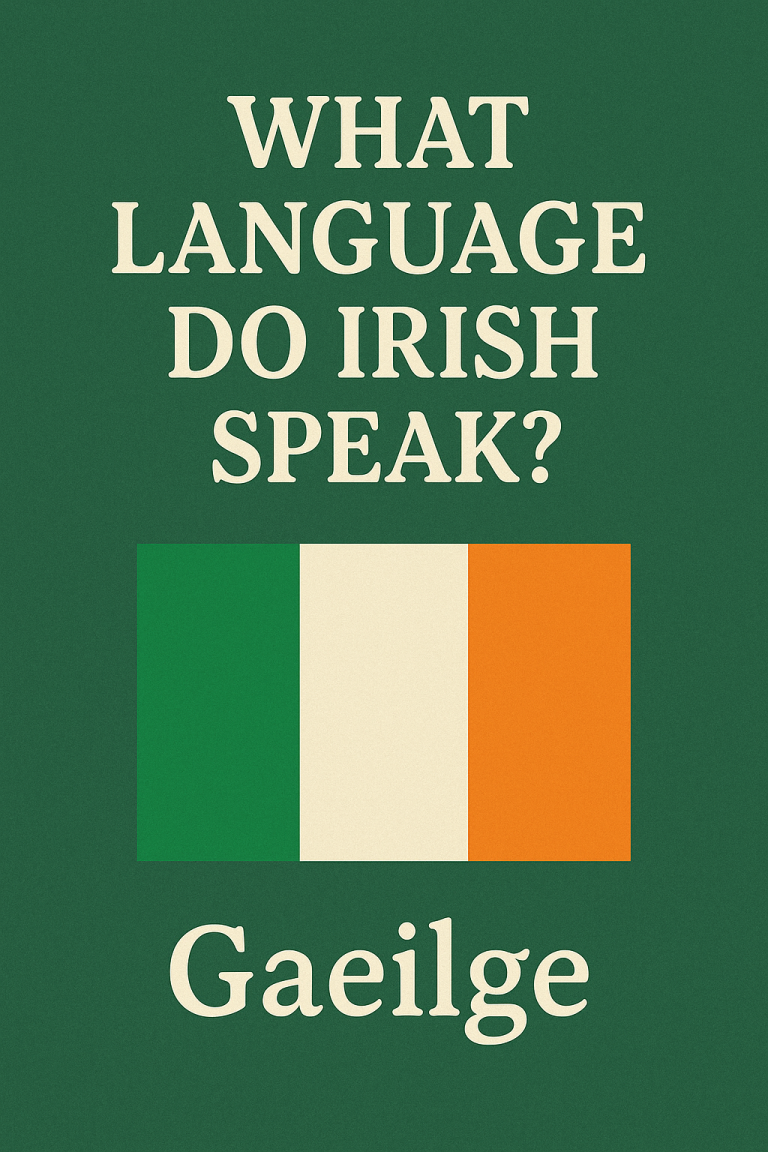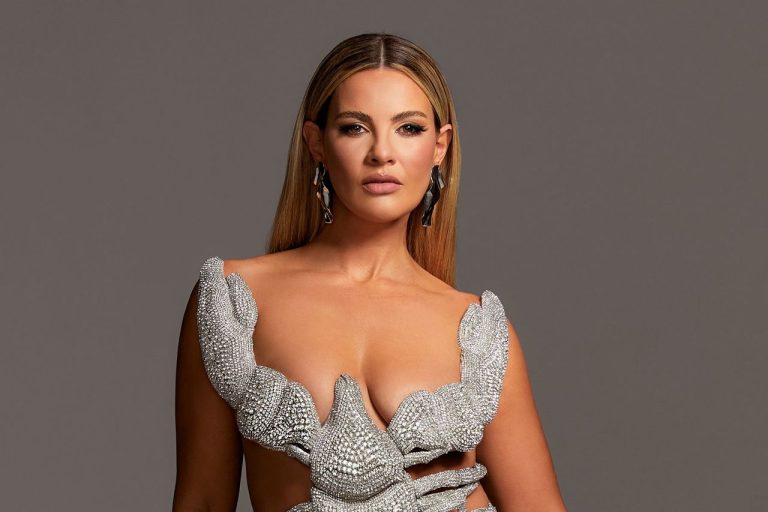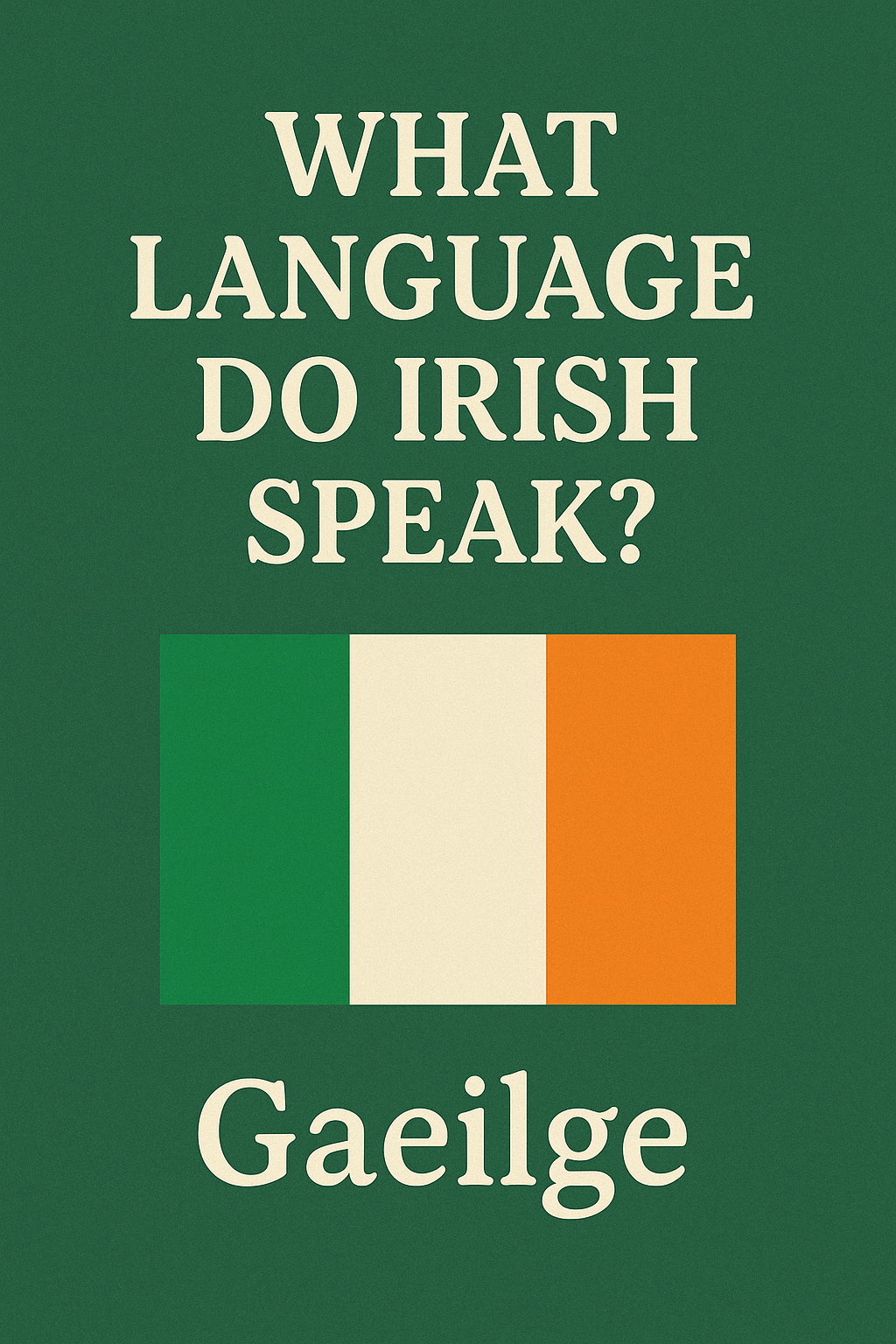
Ah, Ireland—the land of emerald hills that roll like drunken poets under a sky that weeps and laughs in the same breath.
If you’ve ever stood on the Cliffs of Moher, wind whipping your face like an old lover’s slap, or nursed a pint in a Dublin pub where the air hums with half-forgotten songs, you’ve felt it: the pulse of a place woven from stories. But what language do they speak in Ireland?
It’s a question that dances on the tongue, simple yet sly, pulling you into the island’s bilingual heart. In 2025, as the world spins faster and borders blur like watercolor in the rain, Ireland’s tongues—English and Irish, the sturdy workhorse and the wild stallion—still tell tales of survival, rebellion, and quiet resurrection.
Picture this: You’re in a thatched cottage in Connemara, the Atlantic roaring approval outside, and an old fisherman, his hands gnarled as ancient oaks, mutters a curse in Gaeilge that curls the air like smoke from a peat fire. English? Aye, that’s the daily bread, the currency of the pub banter and the boardroom brogue.
But Irish? That’s the soul-stirring whiskey, the language of banshees and ballads, clinging to life in Gaeltacht pockets where the wind carries secrets from Celtic gods.
This isn’t just linguistics; it’s a love letter to resilience, a middle finger to empires that tried to silence it. Buckle up, wanderer— we’re unraveling the linguistic tapestry of the Emerald Isle, one lyrical thread at a time.
The Bilingual Backbone: Ireland’s Official Languages in 2025
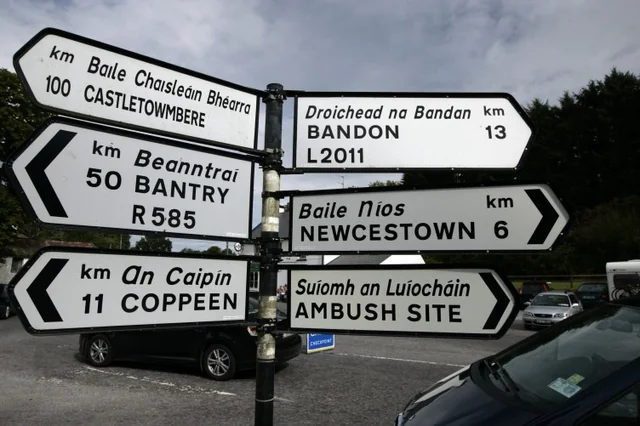
Let’s cut through the mist like a well-aimed slingshot. Ireland official languages English and Irish (Gaeilge) hold court as the twin pillars of the Republic’s voice.
English dominates, spoken by over 99% of the 5.1 million souls south of the border, a pragmatic inheritance from centuries of English rule that turned rebellion into rhythm.
But Irish? It’s the first official language, enshrined in the Constitution since 1937, a nod to the island’s ancient heartbeat. In Northern Ireland, English reigns de facto, but Irish gets its due under the 2022 Identity and Language Act, with Ulster Scots whispering in the wings.
Why the duality? It’s history’s hangover. The Normans crashed the party in 1169, Vikings before them carving runes into the chaos, but it was the Tudors and Plantations that shoved English down Gaelic throats. By the 19th century, famine and flight had whittled Irish speakers to a whisper.
Yet here in 2025, revival stirs like a hungover giant. Apps like Duolingo boast 2.3 million learners worldwide, and TG4— Ireland’s Irish-language TV—pulls 160,000 viewers weekly for soaps that make you weep and cheer in equal measure. It’s not just policy; it’s passion, a refusal to let the old words die quiet.
Engage with me here: Ever tried ordering a coffee in Gaeilge? “Caife le bainne, le do thoil.” The barista’s grin could light Dublin’s dark alleys. That’s Ireland’s magic—languages layering like Guinness foam on stout, inviting you to sip from both.
Unveiling the Gaelic Language: More Than Mere Words
Now, lean in close, for we’re dipping into the Gaelic language, that ancient Celtic kin spoken by druids under oak groves before Rome was a twinkle in Caesar’s eye.
Irish Gaelic— or simply Irish, if you’re local— isn’t some dusty relic; it’s alive, kicking, scripted in Ogham notches from the 4th century.
Part of the Goidelic branch, it shares blood with Scottish Gaelic and Manx, cousins divided by sea but united in melody. Imagine words like “uisce” (water), flowing like the River Shannon, or “grá” (love), sharp as a leprechaun’s wit.
But Gaelic? Ah, the term’s a slippery eel. In Scotland, it’s their tongue; here, it’s Irish we claim, lest confusion curdle the conversation.
The Gaeilge language— pronounced “Gwayl-guh”— rolls off the tongue like a Connemara wave, its three dialects (Ulster, Connacht, Munster) as varied as the counties they hail from. Ulster’s got that northern bite, Connacht the lyrical lilt, Munster the musical moan. It’s poetry in motion, where sentences twist like Celtic knots, defying English’s straight lines.
Why does it matter in 2025? Because in a world of AI babble and emoji shorthand, Gaeilge reminds us of roots. It’s in the schoolyards, where kids conjugate verbs amid hurley sticks, and in the halls of power, where TDs debate in the Dáil with fadas dotting their fury. Feel that pull? It’s the language calling you home, even if you’ve never set foot on Irish soil.
How Many People Speak Irish? The Numbers That Sing in 2025
Crunch the bones of the 2022 Census— the latest oracle before 2025’s whispers— and you’ll find 1.87 million in the Republic claim some grasp of Irish, a hearty 40% of the populace aged three and up.
But daily speakers? A more intimate 72,000 outside schools, hearts beating strong in Gaeltacht enclaves. Up north, 71,900 chat in Irish weekly, per the 2021 tally. How many people speak Irish? Globally, it’s 100,000 natives, but learners swell the ranks to millions, fueled by apps and exile nostalgia.
Yet here’s the rub: Proficiency wanes. Only 10% speak it “very well,” 32% “well,” the rest fumbling like tipsy fiddlers. In Gaeltachts— those sacred west-coast havens housing 106,000 souls— 66% converse in Irish, down from 69% in 2011, a slow bleed to English’s siren call. But revival roars: Gaelscoileanna (Irish-medium schools) enroll 60,000 kids, urban hubs like Dublin birthing “Gaeltachts” of hipster speakers. It’s not decline; it’s evolution, a phoenix in pixelated flight.
Question for you, reader: If you could whisper one secret in Gaeilge, what would it be? The language waits, patient as the Atlantic.
Ireland Language Percentage: A Mosaic of Tongues in 2025
Zoom out to the full chorus: Ireland language percentage paints a vibrant patchwork. English? 99%, the lingua franca from Belfast pubs to Cork boardrooms.
Irish? 40% claim it, but daily use hovers at 2%. Immigrants— 17% of the pop— sprinkle 182 tongues: Polish leads at 136,000 speakers, French 55,000, Arabic and Chinese trailing like exotic spices.
What are the top 3 languages spoken in Ireland? English (92.8% fluency), Irish (13% conversational), Polish (top foreign at ~3%).
In cities, it’s a babel: Dublin’s streets hum with Ukrainian refugees’ resolve, Galway’s with Breton echoes from Celtic kin. Rural west? Gaeilge clings at 75% in strongholds.
Percentages shift like tides— urban youth revive Irish at 47% for ages 20-24, dipping to 30% by 30s as jobs demand English. It’s a living chart, not static ink: 2025 sees Duolingo spikes, EU funds flowing, a nation multilingual as its myths.
Does Ireland Have Their Own Language? The Soul of Sovereignty
Straight to the marrow: Yes, and it’s Irish, the native flame that English couldn’t fully snuff. Born from Primitive Irish whispers 2,500 years ago, it birthed Scotland’s Gaelic and Manx’s murmurs.
Colonization scarred it— Penal Laws banned its use, schools thrashed its speakers— but sovereignty revived it. The 1922 Free State mandated it in courts, schools; today, it’s EU-official, road signs bilingual badges of pride.
Own? Aye, fiercely. From the Book of Kells’ illuminations to Seamus Heaney’s Nobel nods, it’s woven into identity. In 2025, with Brexit’s border blues, Irish stands taller, a cultural moat. Not just words— it’s the warp and weft of who we are, unapologetic and unbroken.
What Is an Irish Accent? The Melody That Hooks the Heart
Oh, the Irish accent— that silver-throated siren, varying wilder than the weather. Dublin’s D4 drawl, posh as polished mahogany; Cork’s staccato snap, quick as a fox’s flick; Donegal’s soft lilt, rolling like Connemara mist. It’s Hiberno-English, laced with Irish syntax: “I’m after eating” for fresh fullness, “grand” for anything tolerable.
Born of bilingual brains, it borrows Gaeilge’s rhythm— rising cadences, “th” as “t,” “r” trilled like rain on tin. In 2025, global telly amplifies it: from Barry Keoghan’s gritty growl to Saoirse Ronan’s ethereal flow. It’s not accent; it’s allure, drawing you in like a ceili dance, leaving you humming long after.
Try it: Say “craic” (crack)— the fun that fuels Irish nights. Feel the hook? That’s the accent’s gift.
How Do You Say Basic Words in Irish? Your Starter Kit to Gaeilge Charm
Ready to flirt with the tongue? How do you say basic words in Irish? Start simple, build bold. “Dia dhuit” (Dee-a gwit)— hello, God’s to you. “Go raibh maith agat” (Guh rev mah agut)— thanks, may good be with you. “Sláinte” (Slawn-cha)— cheers, health be yours. “Tá mé go maith” (Taw may guh mah)— I’m good, the essence of Irish understatement.
Numbers? “Aon, dó, trí” (One, two, three)— count sheep in the Gaeltacht. Food? “Arán” (bread), “Im” (butter)— staples of the soul. Practice in a mirror; the words warm like whiskey. Locals beam at efforts, turning strangers to friends. In 2025, voice apps gamify it— why not join the chorus?
- Hi: Dia dhuit!
- Goodbye: Slán abhaile (Safe home).
- Yes/No: No direct words— echo the verb, Is ea? (Is it?).
- Beer: Beoir (B’yore)— order with gusto.
How Do You Say “Hi” in Ireland? A Greeting Warmer Than a Turf Fire
Specifically, How do you say “hi” in Ireland? In English, it’s “hi” or “hiya,” casual as a nod over the garden wall. But for the full embrace, “Dia duit” (singular) or “Dia daoibh” (plural)— God to you, a blessing in brevity. Follow with “Conas atá tú?” (How’s it going?), and you’ve cracked the code to Irish warmth.
In pubs, it’s “What’s the craic?”— what’s the fun? No stiff handshakes; hugs or back-slaps seal it. 2025 twist: Emojis can’t capture it, but TikToks of Gaeilge hellos go viral, bridging old world to new.
What Is the Irish Goodbye? Slipping Away Like a Shadow
Ah, the Irish goodbye— not a farewell in words, but in action: vanishing from the party without fanfare, a ghost in the gloaming. Born of overcrowded wakes or raucous ragers, it’s practicality wrapped in poetry. No awkward “must dash”— just a quiet exit, pint in hand, into the night.
Why? Survival instinct; Irish hospitality traps you till dawn. In 2025, it’s meme gold: “Pulling an Irish goodbye before the Uber arrives.” Next time you’re fading from the fray, blame the culture— it’s not rude, it’s ritual.
Do Irish Speak Gaelic or Celtic? Clearing the Celtic Fog
Do Irish speak Gaelic or Celtic? Gaelic’s the family— Irish is the Goidelic branch, Celtic the broader clan including Welsh and Breton. Irish speakers say “Irish,” not “Celtic”— that’s like calling your da “mammal.” Gaelic evokes Scotland; here, it’s Gaeilge, pure and pointed.
Daily? Mostly English, but 72,000 weave Gaelic threads. It’s not either/or; it’s a blend, Celtic roots in English soil.
Should I Say Gaelic or Irish? The Local’s Lowdown
Should I say Gaelic or Irish? If you’re stateside, “Irish Gaelic” avoids mix-ups with Scottish kin. In Ireland? “Irish” or “Gaeilge”— Gaelic’s fine in Ulster, but south, it risks raised brows. It’s respect: Call it by its name, like greeting an old flame.
What’s the Closest Language to Irish? Kin Across the Waves
What’s the closest language to Irish? Scottish Gaelic, hands down— shared Middle Irish roots, mutually intelligible in spots. Manx follows, revived from extinction. Welsh? Distant cousin, beautiful but baffling. They’re Celtic siblings, whispering across straits.
What City Speaks the Most Irish? Galway’s Gaeilge Glow
What city speaks the most Irish? Galway edges it— 41.4% speakers in city ‘n’ suburbs, Gaeltacht arms hugging the bay. Cork nips at 40.9%, Dublin lags at 32.8%. Galway’s the pulse: Festivals, filí (poets), and a vibe that sings in two tongues.
Why Is Irish No Longer Spoken? The Wounds of History
Why is Irish no longer spoken? Colonization’s cruel calculus: Penal Laws (1695) barred it from courts, schools; Famine (1845-52) felled speakers by millions. English was power, survival— Irish, a luxury lost. By 1851, under 25% spoke it. But “no longer”? Nah— it’s evolving, not extinct.
Why Is Irish Called Irish? A Name Born of the Land
Why is Irish called Irish? From “Éire,” the island’s Gaelic name, via Old Irish “Goídelc” for its speakers, the Gaels. It’s tautological— the language of the Irish. Simple, sovereign, sung from bards to ballots.
How Do You Pronounce Gaelic? The Guttural Grace
How do you pronounce Gaelic? “Gay-lik” for Irish/Scottish, “Gal-ik” in Scots dialect. Gaeilge? “Gwayl-guh.” It’s throat-rasp and lip-smack, a sound that summons ancestors. Practice: Let it rumble like thunder over Tara.
Is Irish Considered Caucasian? Tongues and Tribes
Is Irish considered Caucasian? Language? No— Irish is Celtic, Indo-European stock. But speakers? Mostly white Irish folk, though global learners diversify. “Caucasian” muddles race with roots; Irish is heritage, open to all who hum its hymns.
Wrapping the Reel: Ireland’s Languages, Your Invitation
As the sun dips over the Giant’s Causeway, casting shadows like forgotten fadas, remember: what language do they speak in Ireland is English for the everyday, Gaeilge for the eternal. In 2025, with euros in pocket— that’s Ireland currency, the euro (€) south, pound (£) north— wander, listen, speak. Visit a Gaeltacht, crack a phrase, feel the island respond.
Why linger on lines? Ireland’s lilt is in the living. Book that flight, raise that glass— sláinte to the tongues that bind us. What’s your first Gaeilge word? Share below; let’s weave more words into the wind.
FAQs: Your Burning Questions on Ireland’s Lingo
What Language Is Spoken Mostly in Ireland?
English, hands down— 99% fluency, the bridge to the world. But Irish hums beneath, in songs and signs.
What City Speaks the Most Irish?
Galway, with 41.4% speakers, a Gaeltacht heartbeat in urban veins.
How Do You Say “Hi” in Ireland?
“Dia dhuit”— a divine hello that warms like poteen.
Does Ireland Have Their Own Language?
Absolutely: Irish, the native flame flickering fierce.
What Is an Irish Accent?
A symphony of lilts, from Dublin drawl to Kerry keen— English kissed by Gaelic ghosts.
How Do You Say Basic Words in Irish?
Start with “go raibh maith agat” (thanks)— easy entry to enchantment.
What Is the Irish Goodbye?
Slip out sans scene, a nod to nights that never end.
Is Irish Considered Caucasian?
Race and language mix poorly; Irish is Celtic craft, speakers diverse.
Should I Say Gaelic or Irish?
Irish in Ireland— Gaelic risks Scottish confusion.
What’s the Closest Language to Irish?
Scottish Gaelic, kin separated by salty miles.
Why Is Irish No Longer Spoken?
Empire’s echo: Laws, famine felled it— but revival rises.
Why Is Irish Called Irish?
From Éire’s people, the Gaels— straightforward sovereignty.
How Do You Pronounce Gaelic?
“Gay-lik”— let it growl from the gut.
